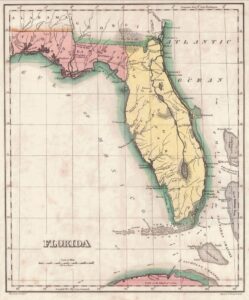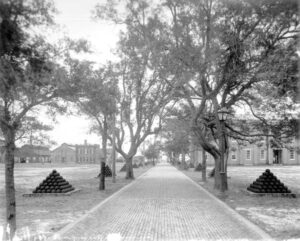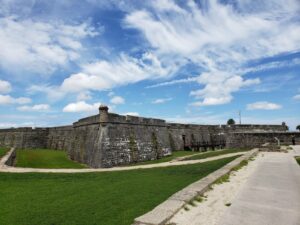I have continued on my search to find a map of Florida, although now that I have several, I’m even more lost than with any GPS system. Not to ignore the early Paleo-Indian inhabitants of the peninsula, we know that Florida’s written history begins with the arrival of the Europeans. The Spaniard Juan Ponce de León wrote the first records in 1513 and named it Florida—flowered one—for its verdant landscape. Florida was under Spanish colonial rule from the 16th century to the 19th century (with a brief period of British rule during the 18th century). It became a territory in 1821 and the 27th state of the Union on March 3, 1845.
 Early maps of Florida dating from 1822 to the present look whimsical, abstract or historic depending on your favorite search site. All the maps have hundreds and hundreds of Spanish names, often misspelled just like the street names one can find in any Floridian suburban neighborhood. I have settled on a huge map from the AAA office when I realize that I have a personal history with the state.
Early maps of Florida dating from 1822 to the present look whimsical, abstract or historic depending on your favorite search site. All the maps have hundreds and hundreds of Spanish names, often misspelled just like the street names one can find in any Floridian suburban neighborhood. I have settled on a huge map from the AAA office when I realize that I have a personal history with the state.
I lived at the Navy Base in Pensacola as a young Marine Corps wife. I remember arriving there after a brief stay in Quantico, Virginia –all Marine Corps deployments, except for Vietnam, seemed to be brief. We drove in our old Rambler with its gears on the steering wheel. I didn’t know how to drive yet; did I mention that I was young? We looked at a short-term rental and even signed a contract, but the first day at our new place we were overcome by the humid smell and mold growing everywhere and decided to live in base housing. It was the days before air conditioned. We had a second-floor apartment with fans in its high ceilings. The Navy Yard was formed by identical white barracks with dark green shutters lined up at either side of the road.
 The most memorable event happened on Labor Day weekend. A category 4 hurricane, Betsy, was forecast; my very first hurricane. The Marines had left the base; they had to fly the airplanes inland out off harm’s way. The wives were told to close the shutters tight and stay indoors. I was feeling sick with a severe abdomen pain and I prayed that I wouldn’t be pregnant yet. By midnight I was rushed to the Navy Hospital with appendicitis. I only remember waking up in a dark room with corpsmen all around. I don’t know who took me home, but I can almost see the white dust that covered everything despite the shutters being closed.
The most memorable event happened on Labor Day weekend. A category 4 hurricane, Betsy, was forecast; my very first hurricane. The Marines had left the base; they had to fly the airplanes inland out off harm’s way. The wives were told to close the shutters tight and stay indoors. I was feeling sick with a severe abdomen pain and I prayed that I wouldn’t be pregnant yet. By midnight I was rushed to the Navy Hospital with appendicitis. I only remember waking up in a dark room with corpsmen all around. I don’t know who took me home, but I can almost see the white dust that covered everything despite the shutters being closed.
I still had a student visa then and, during another weather event with torrential rains, we drove to Mobile, Alabama, the closest Spanish Consulate, to start my citizenship papers. By the time we arrived, the roads were completely flooded and the offices had closed. We only made it to Pensacola’s beautiful beaches a couple of times and before we knew it, we were on the move to Jacksonville for more training.
 The best part of this second Florida experience was to be near Saint Augustine. Another Spaniard, Pedro Menéndez de Avilés, founded this city, which served as Florida’s capital for over 200 years. An hour’s drive from Jacksonville, we drove there often to visit Castillo de San Marcos, the Cathedral Basilica and other historic attractions. It almost felt like being in Spain.
The best part of this second Florida experience was to be near Saint Augustine. Another Spaniard, Pedro Menéndez de Avilés, founded this city, which served as Florida’s capital for over 200 years. An hour’s drive from Jacksonville, we drove there often to visit Castillo de San Marcos, the Cathedral Basilica and other historic attractions. It almost felt like being in Spain.
By the time we left Florida for North Carolina, I was indeed pregnant with my first daughter. Due to our frequent moves, my visa was still not resolved. My husband was being trained to fly the F-4 Phantom over North Vietnam and he needed top security clearance, having a foreign wife without papers complicated the situation. Somehow it got resolved with a house visit by the Office of U.S. Citizenship and Immigration Services. I didn’t know how to drive yet. Finally, I took the driver’s test in someone else’s automatic car, because I never mastered the Rambler gears.
Didi was born fourteen days before her father had to leave for Vietnam. In fact, his squadron had already left and was stationed in Okinawa, Japan, very much like those planes that flew out of Pensacola, anticipating the hurricane.

Cuantas aventuras! Y que hiciste con tu recién nacida cuando John se fue a VietNam? Te quedaste sola en la base? Cristina
Muy buena pregunta. Entonces las familias NO podían quedarse en la base. Nos fuimos a West Lafayette, Indiana, donde vivían mis padres. Tuvo sus ventajas y sus desventajas. La ley ha cambiado hoy en día y las familias se pueden quedar en las bases donde tienen apoyo, amistades, el PX… Concha
Me encanta todo lo que cuentas de huracanes y de ser la wife de un soldado. Que tiempos!
Me impresiona que Florida tenga tan buena fama entre los americanos con ese clima infernal
Y me encanta tu interés y tu amor por los mapas. Me recuerda a mi padre, y en general a mi familia. Papá leía el periódico con el atlas abierto y me acuerdo que para la jubilación de mi hermana mayor le regalamos entre todos un súper-atlas que acababa de publicarse
En fin, me gusta tu blog y me trae recuerdos y me hace pensar. Lo leo en inglés y luego en español. Es asombroso verlo traducido en un minuto
Un montón de besos
Inés
La verdad es que es increíble lo popular que es Florida y no lo digo solamente por el tiempo. También está la política, el sistema educativo, en fin… es como un país extranjero.
Te agradezco siempre tu interés por mi blog. Eres mi brújula y mi puente con España. A veces me siento muy lejos de allí.
Besos, Concha
Hi, Concha,
I receive your interesting and amusing blogs, which maintain a somewhat illusory sense of continued contact….
XXOO, Phil
Glad you read my blog, it keeps me engaged.
XXOO, Concha